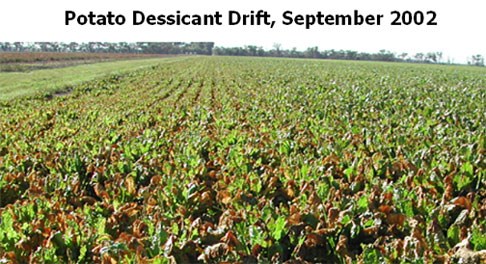518 - Food Safety and Pesticide Use
The American Crystal Sugar Company Board at their November 2008 meeting approved the "Policy Providing For The Destruction of Sugarbeet Acreage Due to The Presence of Misapplied Chemicals."
American Crystal Sugar Company has long stressed proper pesticide use in Annual and Five Year agreements with shareholders. Company and university sponsored educational programs focus on application of pesticides only according to EPA labeling requirements. Growers also take training to meet private pesticide application standards.
Why is it necessary to put an even stronger pesticide use policy in place? The reasons are numerous and they include:
- A need to be a preferred supplier of safe sugar and by-products to customers
- Meeting customer requirements regarding food and feed safety
- To continue to comply with all pesticide regulatory agency requirements
- Prevent pile contamination
- Prevent sugar silo, pulp shed, or molasses tank contamination
- Avoid public relations disasters and loss of markets and customers
- Environmental stewardship - it's the right thing to do
Recent Food Safety Public Relations Disasters
- E-coli in spinach
- E-coli in tomato
- Star Link corn
- Tainted hamburger in school lunch program
- Quaker Oats insecticide residue
Circumstances That Are Grounds for Destruction
- Intentional application of a pesticide that is not labeled or registered
- Unintentional application of a pesticide that is not labeled or registered
- Spray drift to a field from any source resulting in detectable residues of unlabeled pesticide
- Violation of rotational label restrictions that result in detectable residues

What Information Has Been Used to Develop This Policy?
- Meetings with Minnesota and North Dakota Departments of Agriculture.
- Southern Minnesota Beet Sugar Cooperative and Minn-Dak Farmers Cooperative Food Safety management strategies have been reviewed.
- Comprehensive spray drift studies have been conducted by third party research companies in 2006 and 2007.
- Residue analysis studies have been conducted at South Dakota State University in 2006 and 2007.
- Other major food company policies on pesticide management were evaluated; one example was Ocean Spray, Inc.
Opportunities to Learn More
- The policy will be discussed at "Your Way to Grow" meetings in every factory district in January.
- Your agriculturist will have complete details on the new policy in early January.
What Can A Grower Do Yet This Winter?
- Be sure rented land has no rotational plant back to beets restrictions.
- Review the 2008 and 2009 Sugarbeet Production Guide information on registered pesticide use and carryover and plant back restrictions.
- The 2008 Sugarbeet Production Guide from North Dakota State University and University of Minnesota lists 55 products with rotation restrictions for sugarbeet.
A Hearty Holiday Season "Thank You" to everyone who responded to David Kragnes' bell-ringing for the Salvation Army at the Annual Meeting last week. The Salvation Army informs us that the kettle was stuffed with $1,776. That is $500 more than the most they received in any single kettle during all of the 2007 Christmas season up to that time.
David said that many people told him that they also were bell-ringers in their own home towns. Thanks to all of you for your contributions, and for helping out in your communities!
